11 Eco-Friendly & Sustainable Furniture Brands to D-Eco-Rate Your Home
Just how healthy is the environment in your home?
At the risk of sounding alarmist, most traditional home furnishings are made with unsustainable (and toxic) materials that may pose a risk to you, your family, and the environment.
Which is why we’re tackling this area of sustainable living by encouraging everyone to kit out their eco-cribs with ethical and sustainable furniture.
Shopping for eco-friendly furniture can feel overwhelming, not least because there are a ton of materials and finishes to consider—all with different environmental, social, and health-related impacts.
It’s our goal to lighten the load by compiling this list of the best sustainable furniture companies for low-impact lounging and sustainable snoozing.
Wondering how to buy furniture sustainably?
Let’s start with a few of our showroom faves.
Everything we recommend to you on Sustainable Jungle is independently researched and we ask all brands to confirm their claims. To avoid waste, we test products on an as needed basis. This post contains affiliate links. If you buy something through our links, we may earn a small commission. Learn more about why we do this here.
Sustainable Furniture Manufacturers For A Healthy Home
Burrow’s clever, flexible, durable, and safe furniture designs are made with sustainably-sourced wood and non-toxic finishes.
For the sheer variety of products and some of the most clever repurposing around, Etsy Reclaimed has arguably the best eco-friendly furniture made from recycled materials.
Medley makes for a welcome house guest with their sustainable furniture made in the USA. All of their materials are responsibly sourced and pieces are designed to last.
To find out how we stacked the tables and chairs to find the best sustainable furniture brands, head to the foot(rest) of the article.
The Full List Of Eco-Friendly Furniture Companies
- Burrow | Visit Store
- Medley | Visit Store
- Etsy Reclaimed | Visit Store
- Made Trade | Visit Store
- Maiden Home | Visit Store
- Masaya & Co. | Visit Store
- What WE Make | Visit Store
- Urban Wood Goods | Visit Store
- Avocado | Visit Store
- Emeco | Visit Store
- West Elm | Visit Store
1. Burrow
About Burrow
Price Range: $195–$7,090
One of our favorite eco-friendly sofa brands, we love burrowing into anything by Burrow.
They offer a full range of modern eco-friendly living room furniture, including sectionals, sofas, accent chairs, and loveseats.
For curling up with a good sustainability book, take a peek at the Pika Chair, whose stylishly compact design makes it the perfect versatile piece for small spaces.
You’ll also find bed frames, dressers, nightstands, benches, shelves, coffee tables, and outdoor furniture.
Burrow’s Ethical & Sustainability Practices
Materials:
Burrows seating combines a Baltic birch frame with steel hardware and a choice of steel or sustainably sourced wooden legs.
For upholstery, they use upcycled olefin, polyester, Italian leather and velvet.
While a type of polypropylene, olefin is processed without chemical additives and PFCs. It’s also stain and scratch resistant.
Cushions are CertiPUR-US certified foam (read: no chemical flame retardants, formaldehyde, heavy metals, ozone depleters, or phthalates).
Some of Burrow’s coffee tables and stools are made of local and sustainably-sourced solid ash, others are made with veneered plywood with solid wood legs. Bed frames are made from hardwood with non-toxic finishes.
Supply chain & labor practices:
Burrow offers eco-friendly furniture made in the USA, Vietnam, India, Poland, and Mexico.
One of the most affordable eco-friendly furniture companies, Burrow cuts out the middleman by selling directly to customers.
Carbon commitments & green practices:
Durability is a top priority for Burrow, and they’ve conducted tests to prove it.
The modular design of their seating means you can configure and reconfigure your furniture however you like—ideal for moving house or room makeovers without needing to buy new.
You can also extend pieces when you need to size up.
2. Medley
About Medley
Price Range: $995–$6,438
Founded by two brothers, Medley is on a mission to give the furniture industry a sustainability overhaul.
They offer timeless and durable furniture for every room in the house: sectionals, accent chairs, sleeper sofas, beds, ottomans, benches, accent tables, dining tables, and storage pieces.
With its sustainable modular furniture design and spacious pull-out bed for guests, the Blumen Sofa Bed has us feeling anything but blue.
Medley’s Ethical & Sustainability Practices
Materials:
To Medley, sustainably sourced furniture means domestically-sourced and FSC-certified wood like kiln-dried alder, solid walnut and maple, and low VOC plywood (used only for backs and drawer bottoms).
The wood is finished with USDA organic natural furniture polish made with beeswax, carnauba wax, and olive oil.
For cushions, choose between CertiPUR-US®-certified synthetic foam and GOLS-certified organic latex.
Other eco-friendly materials include OEKO-TEX cruelty-free Eco Wool (in their mattresses), natural jute webbing, GOTS-certified organic cotton upholstery lining, and either recycled or Greenguard Gold-certified synthetics.
All the pieces are free of VOC adhesives, fire retardants, fluorocarbons, heavy metals, pesticides, preservatives, phthalates, formaldehyde, and azo dyes.
Supply chain & labor practices:
For sustainable furniture USA, look no further than Medley.
Everything is ethically handcrafted in Portland, Los Angeles, or Chicago.
Carbon commitments & green practices:
Medley’s furniture is built to last. Their alder hardwood frames are backed by a lifetime warranty and mattresses with a twenty-year warranty.
Community & charitable giving:
For every tree used in their sustainable home furniture, Medley plants three more via the National Forest Foundation.
3. Etsy Reclaimed Furniture
About Etsy Reclaimed Sustainable Furniture
Price Range: Various
One of our favorite alternatives to Amazon for all kinds of products, Etsy is also one of the best places to shop for affordable sustainable furniture.
With a near-constant influx of new designs and shops, there are plenty of unique pieces, from reclaimed barrel wine holders to coffee tables made of salvaged driftwood.
Our favorite Etsy eco-friendly furniture stores include Reclaimed Wood USA and Urban Billy, both of which specialize in using reclaimed materials to make rustic, farmhouse-inspired furniture.
Etsy Reclaimed’s Ethical & Sustainability Practices
Materials:
There’s no end to the innovative upcycled materials individual makers use in some seriously creative ways.
Common upcycled sustainable materials for furniture on Etsy include wood (from salvaged lumber, antique barn wood, fallen logs, and palettes) and metal (upcycled iron, copper and iron piping, and chicken wire).
Supply chain & labor practices:
Etsy allows you to “Stand with Small”, which supports independent artisans and craftsmen, and means smaller supply chains (and less risk of human rights abuse).
They’re also home to a high concentration of American-made furniture brands.
Carbon commitments & green practices:
Many items are handmade-to-order, guaranteeing top-notch craftsmanship, one-of-a-kind pieces, and less waste.
Etsy is powered by 100% renewable energy and offsets 100% of carbon emissions from sellers’ shipping.
To further reduce shipping emissions, you can search for local or nearby sellers, too.
4. Made Trade
About Made Trade
Price Range: $230–$6,185
Made Trade’s curated ethical furniture collection is an easy way to discover feel-good furniture brands for the home.
You can shop by purpose or value, including BIPOC Owned, Women Owned, Fair Trade, Handcrafted, Recycled and Upcycled, Made in USA, and more.
You’ll find fair trade furniture ranging from KAZI’s gorgeous woven grass side tables and headboards to MBare’s FSC-certified natural cane love seats.
If you’re after a more futuristic, contemporary vibe, check out the all-weather recycled plastic outdoor furniture from Loll Designs.
Made Trade’s Ethical & Sustainability Practices
Materials:
From Mbare’s woven bamboo cane furniture to Emeco’s recycled aluminum chairs, there’s a variety of sustainable materials (either natural, recycled, or both) found across Made Trade’s curated range.
Loll Designs’ durable furniture is made mostly from plastic milk jugs, of which they repurposed hundreds of millions to date. Designed to also be recyclable furniture at end-of-life, they’re Cradle to Cradle-certified.
Supply chain & labor practices:
Responsible sourcing and transparency are top priorities for women-owned and family-run Made Trade.
They ensure their brand partners have fair and equitable working practices and that all artisans and makers are paid fair wages. You can read specific details in each ethical furniture store’s bio.
For example, KAZI is a Fair Trade Federation member, MBare products are handmade by artisans in Malawi, and Loll Designs manufactures in the USA in Minnesota.
Carbon commitments & green practices:
Made Trade is Carbon Neutral Certified through support of three conservation projects.
5. Maiden Home
About Maiden Home
Price Range: $500–$9,895
Maiden Home is one of the sustainable furniture companies we’d be happy to welcome into our home.
With minimalist timeless pieces, handcrafted using heritage techniques, this is “slow furniture” at its best.
Whether you’re looking for sustainable bedroom furniture, living room, or dining furniture, Maiden Home offers plenty of different designs and eco-friendly materials.
Among the more minimalist furniture brands, Maiden’s pieces prioritize soft neutrals, clean lines, and simple, space efficient designs—embodied by the nesting Vestry coffee tables.
Maiden Home’s Ethical & Sustainability Practices
Materials:
All hardwoods (like the solid oak used in many pieces) bear sustainable forestry certifications from the SFI, and any steel is recycled.
Their cushions feature CertiPUR-US®-certified soy-based foam, which we generally recommend avoiding due to the deforestation issues linked with soya farming. We’ll be reaching out to confirm sourcing policies.
They use several different upholstery materials, including 100% performance linen, a cotton and linen blend, Mohair from Angora goats, Merino wool, and leather. We’ll also ask Maiden for more details on these animal-derived fabrics to determine if they’re ethical leather and wool.
Some of the collections feature down and feather-filled cushions, but a down-alternative (microdenier, an ultra-fine synthetic fiber) is available on request.
Low VOC, water-based glues and finishes are prioritized, and all furniture is free from flame retardants and formaldehyde.
Supply chain & labor practices:
All pieces are handcrafted to order by North Carolina artisans who use heritage techniques to slow craft the pieces.
Carbon commitments & green practices:
Maiden Home works with partners who use eco-friendly manufacturing practices like CNC routing (computer-controlled machines) to reduce wood waste.
Made to last, check out their FAQs for maintenance and care tips on prolonging the life of their quality furniture.
6. Masaya & Co.
About Masaya & Co.
Price Range: $170–$6,220
For minimalist and multi-functional pieces that scream “sustainable style” turn to Masaya & Co.
Their eco-friendly living room furniture includes accent chairs, armchairs, couches, loveseats, rocking chairs, and sectionals in several different styles.
There’s plenty on offer for other rooms, including bed frames, dressers, nightstands, shelves, tables, and stunning environmentally sustainable office furniture like their minimalist Casares Desk, handcrafted from sustainably sourced hardwood.
Masaya’s Ethical & Sustainability Practices
Materials:
Responsibly-harvested solid hardwood (including Teak, Royal Mahogany, and Rosita Walnut) finished with low-VOC natural oil is what you’ll come home to with environmentally friendly furniture from Masaya & Co.
The handmade furniture cushions feature Sunbrella® fabric. While unfortunately acrylic, it is durable, resistant to water and stains, and produced in a low-impact way.
Some styles feature seats, backrests, and headboards handwoven from durable polyester cord.
Supply chain & labor practices:
Masaya & Co was originally founded as a reforestation project but grew into a furniture company thanks to the talent of the artisans in the area.
Their eco furniture is handcrafted in Nicaragua, helping to support 150 craftspeople and designers in the region.
Carbon commitments & green practices:
The locally-sourced hardwoods are dried in solar-powered kilns.
Their Seed to Seat business model is helping to reforest land depleted by cattle farming.
Community & charitable giving:
Masaya & Co plants 100 (yes, 100) trees in Nicaragua for every product sold, now totalling millions.
7. What WE Make
About What WE Make
Price Range: $215–$4,145
Chicago’s What WE Make is a master in handcrafted, customizable, reclaimed wood furniture.
With sleek, contemporary lines and minimalist silhouettes, the timeless pieces will suit any modern home.
Choose between tables, seating, eco-friendly bedroom furniture, bathroom furniture, storage items, media stands, home office pieces, and more.
What WE Make’s Ethical & Sustainability Practices
Materials:
Reclaimed old-growth hardwoods (at least a century old) and sustainably sourced hardwoods finished with no or low VOC eco-friendly finishes are used across WWMake’s collection of sustainable coffee tables and more.
They also use hand-welded metal and durable, special-blend concrete.
Supply chain & labor practices:
This family-owned and operated brand hand makes the furniture in Algonquin, IL.
Carbon commitments & green practices:
Each durable furniture piece is made-to-order with quality craftsmanship, and any scrap wood and sawdust is donated locally to be used for fires and agriculture.
8. Urban Wood Goods
Price Range: $225–$6,095
Urban Wood Goods began with one bench that female founder and CEO Erin True made for herself (following inspiration from a DIY salvage magazine article).
Today, the eco-friendly furniture company specializes in reclaimed wood tables of all sorts and sizes, from desks to conference tables to quaint two-seaters for your breakfast nook.
And what good would a table be without some industrial-chic bar stools or benches?
If you can’t get enough of the dichotomous metal and wood aesthetic, upgrade your home storage with reclaimed pipe shelving units and commission custom pieces.
Urban Woods Goods’ Ethical & Sustainability Practices
Materials:
Unless otherwise noted, all lumber is reclaimed barn wood and centuries-old “Old Growth” lumber complete with original warps, nail holes, textures, and other character elements.
Using this lumber helps reduce the 30 million tons of demolition wood waste going to the landfill every year.
The wooden table tops are combined with salvaged metal pipe accents and American-made steel structures.
Supply chain & labor practices:
This company has a team of 20 craftsmen working in their very own Chicago woodshop.
All reclaimed lumber is salvaged from local sites, and other materials come from nearby USA suppliers.
Carbon commitments & green practices:
They only ship to the US and Canada to minimize cost and shipping emissions.
9. Avocado
About Avocado
Price Range: $329–$2,799
Among the few top tier Greenguard Gold certified furniture brands, Avocado is here to save the day (or night, rather) with its organic bedding.
This “farm to mattress” brand offers not only mattresses in all sizes, but bedding and furniture to match, including reclaimed bed frames, eco-friendly dressers, nightstands, and accent tables.
We love the simple yet stylish Zero Waste Entryway Table, made from 100% recycled beechwood scraps sourced from their own sustainable wooden furniture production.
Avocado’s Ethical & Sustainability Practices
Materials:
The base of Avocado’s mattresses is 100% GOLS organic, eco-INSTITUT®, and OEKO-TEX-certified Dunlop latex, which they make themselves.
The mattresses are covered with either GOTS organic Gaddi wool and kapok fiber or vegan GOTS organic cotton.
All are free of polyurethane foams, off-gassing adhesives, chemical fire retardants, heavy metals, formaldehyde, solvents, Azo dyes, phthalates, and PVC, earning them the GREENGUARD Gold, MADE SAFE, and OEKO-TEX certification, among others.
Their wooden furniture is made of reclaimed or FSC-certified wood with a zero-VOC sealant.
Supply chain & labor practices:
This Certified B Corp co-owns FSC-certified organic rubber tree farms in India.
Ethical wool is sourced from their own free-range sheep. They employ over 100 farmers and 400 herders across 50 Indian villages, provide living wages, and adhere to ILO standards.
Mattresses are made in their own GOTS and GOLS certified factory in Los Angeles.
Carbon commitments & green practices:
Avocado is Climate Neutral certified and now carbon negative through funding of reforestation projects from Carbonfund.org.
They’re also a member of the Sustainable Furnishings Council, back all sustainable mattresses with a 25-year warranty, and pursuing Zero Waste to Landfill certification.
Community & charitable giving:
A member of 1% for the Planet, Avocado donates returned products and 2% of all revenue to charity, including EcoHealth Alliance, Breast Cancer Prevention Partners, among others.
10. Emeco
About Emeco
Price Range: $330–$4,785
Emeco was initially commissioned to make non-corrosive, fire-resistant, and torpedo-proof chairs for the US Navy almost a century ago.
Today, they are still challenging the unsustainable furniture industry by creating chairs, stools, benches, tables, and shelves, all made out of recycled materials and built to last 150+ years.
Their first eco-friendly chair, the classic 1006 Navy Chair, is still available today.
Each piece is understated enough to use indoors and durable enough to act as sustainable outdoor furniture.
Emeco’s Ethical & Sustainability Practices
Materials:
90% of Emeco’s line uses recycled eco-friendly furniture materials.
Recycled aluminum and a VOC-free anodizing finish is their golden (er… metallic) boy.
They also use cork, locally reclaimed or sustainably harvested wood, and recycled PET.
Emeco is also pioneering its own sustainable materials, including Reclaimed Wood-filled Polypropylene (made from leftover plastic from the factory floor mixed with sawdust) and Eco Concrete (made from recycled glass bottles and calcium sulfoaluminate cement).
Supply chain & labor practices:
Emeco hand makes their recycled material furniture in a LEED-certified family factory in Hanover, Pennsylvania, using an intensive 77-step process.
Because their expertise is metal, they rely on nearby Amish woodworkers to craft their sustainable wooden furniture.
Carbon commitments & green practices:
Emeco’s eco furniture manufacturing processes include using energy-efficient lights, buying renewable electricity, and saving water by using welding machines with an internal cooling system.
Any minimal scrap produced is reused, and they offer a chair-to-chair recycling program for their plastic or aluminum pieces.
11. West Elm
About West Elm
Price Range: $199–$5,698
Which major furniture company is making its efforts more sustainable?
That’ll be West Elm. Part of the Pottery Barn conglomerate, this global furniture giant is proof that big, established companies can change for the eco-better.
The West Elm sustainable furniture line now accounts for 60% of their offerings, each piece supporting at least one sustainability initiative: Organic, Sustainably Sourced, Fair Trade certified™, Handcrafted, and GREENGUARD Gold certified.
Their huge range of both in-house and partner brand products can match any aesthetic, from the classic Anton Solid Wood eco-friendly dining table to the edgier, steampunk Drum Storage coffee table.
West Elm’s Ethical & Sustainability Practices
Materials:
52% of West Elm’s wooden furniture (beds, desks, side tables, shelving units, and drawers) are Sustainably-Sourced using FSC-certified wood.
For sofa upholstery, bedding, and rugs, they use either 100% organic cotton, TENCEL™, or REPREVE® recycled polyester, saving 14 million plastic bottles from landfills.
Any sustainable nursery furniture like non-toxic cribs are tested for extra low levels of toxic chemicals and VOCs. Many are GREENGUARD Gold certified for parental peace of mind.
Supply chain & labor practices:
West Elms designs 95% of its products in-house and 65% of everything they sell is made in the USA in an effort to bring manufacturing back to American soil.
They otherwise partner with artisans around the world for their Handcrafted collections.
Carbon commitments & green practices:
Steadily increasing the number of eco-friendly furniture materials in their offerings, West Elm’s third-party certifications include FSC, GOTS, GRS, GREENGUARD, Standard 100 by OEKO-TEX®, and more.
Community & charitable giving:
The brand’s non-profit partners include SickKids, No Kid Hungry, The Trevor Project, and many more, to whom they’ve collectively given over $50 million.
Did you know we Have a Newsletter?
We cover the latest in sustainable living, fashion, zero waste, beauty, travel, finance and more…
How We Choose The Most Sustainable & Eco-Friendly Furniture Brands
Since you’re probably sitting on a piece right now, there’s an important question to ask: what is sustainable furniture and what type of furniture is the most sustainable?
Hint: it’s not Ikea furniture…
But it is many of the same things that make for sustainable and ethical fashion and home textiles like eco-friendly bedding, sustainable cushions and eco-friendly shower curtains.
Materials:
What is the most eco-friendly material for furniture?
Ethical wood furniture is #1 among sustainable furniture materials, not least because it’s biodegradable.
The most sustainable wood furniture is cork or eco-friendly bamboo furniture because both of these materials are renewable, regenerative, and fast-growing.
Hardwoods (like beech, maple, and oak) can take hundreds of years to reach maturity. That’s why virgin hardwoods aren’t ideal. If the hardwood is reclaimed (or at the very least, sustainably-sourced), then it gets a thumbs up.
We advise avoiding plywood and particle wood—AKA composite woods—as they aren’t as durable and typically include toxic adhesives and formaldehyde treatments.
To ensure we’re also getting non-toxic furniture, we look for finishes and glues that are non-toxic, organic, or low-VOC (volatile organic compounds).
For upholstered pieces, it’s best to avoid synthetic fabrics (unless recycled) and opt for natural fabrics like organic cotton, linen, hemp.
Foam cushioning is best when it’s made of natural latex. Avoid “eco-friendly” soy foams because soy farming is responsible for massive swaths of deforestation in South America (greenwashing alert!).
- Certifications: Forest Stewardship Council (FSC), Sustainable Forestry Initiative (SFI), GREENGUARD, OEKO-TEX, Global Organic Textile Standard (GOTS), Global Organic Latex Standard (GOLS), MADE SAFE, Global Recycle Standard (GRS), US Department of Agriculture (USDA), CertiPUR-US®, eco-INSTITUT®
Supply chain & labor practices:
We love affordable sustainable furniture companies, but not when laborers are making up that low cost.
Many of these brands make their furniture products in small workshops in the USA, meaning a stricter labor standard baseline.
Otherwise, we look for third-party manufacturing certifications that help ensure fair and safe working practices.
- Certifications: B Corporation, Fair Trade, Fair Trade Federation (FTF), International Labor Organization (ILO)
Carbon commitments & green practices:
When it comes to sustainable design, furniture should also be efficient and functional. If it’s fair trade modular furniture and easily disassembled, all the better, because then it’s less likely to be tossed in the event of a move.
Handcrafted sustainable furniture means less energy and fewer emissions than machine-made furniture. Custom-made is better still because it requires the piece to be made-to-order, which prevents unsold stock.
Beyond that, we also look for companies committed to reducing their carbon footprint through renewable energy, carbon offset programs, and low-waste packaging.
Community & charitable endeavors:
We love when ethical furniture companies go above and beyond to support their artisan communities or give back to social or environmental organizations.
Final Thoughts On Ethical Furniture Brands
Whether you’re kitting out your home for the first time, replacing that Ikea flat pack from college, or finally upgrading your home office with a new sustainable desk and eco-friendly office chair, investing in sustainable furniture is worth the effort.
Remember only to buy new furniture when you really need to. The most sustainable furniture is the furniture you already own, followed by secondhand furniture.
Know someone who needs an upholstery upgrade?
Instead of passing them an Ikea catalog, pass along this article on the best sustainable furniture for a greener, healthier home.
Pin these:

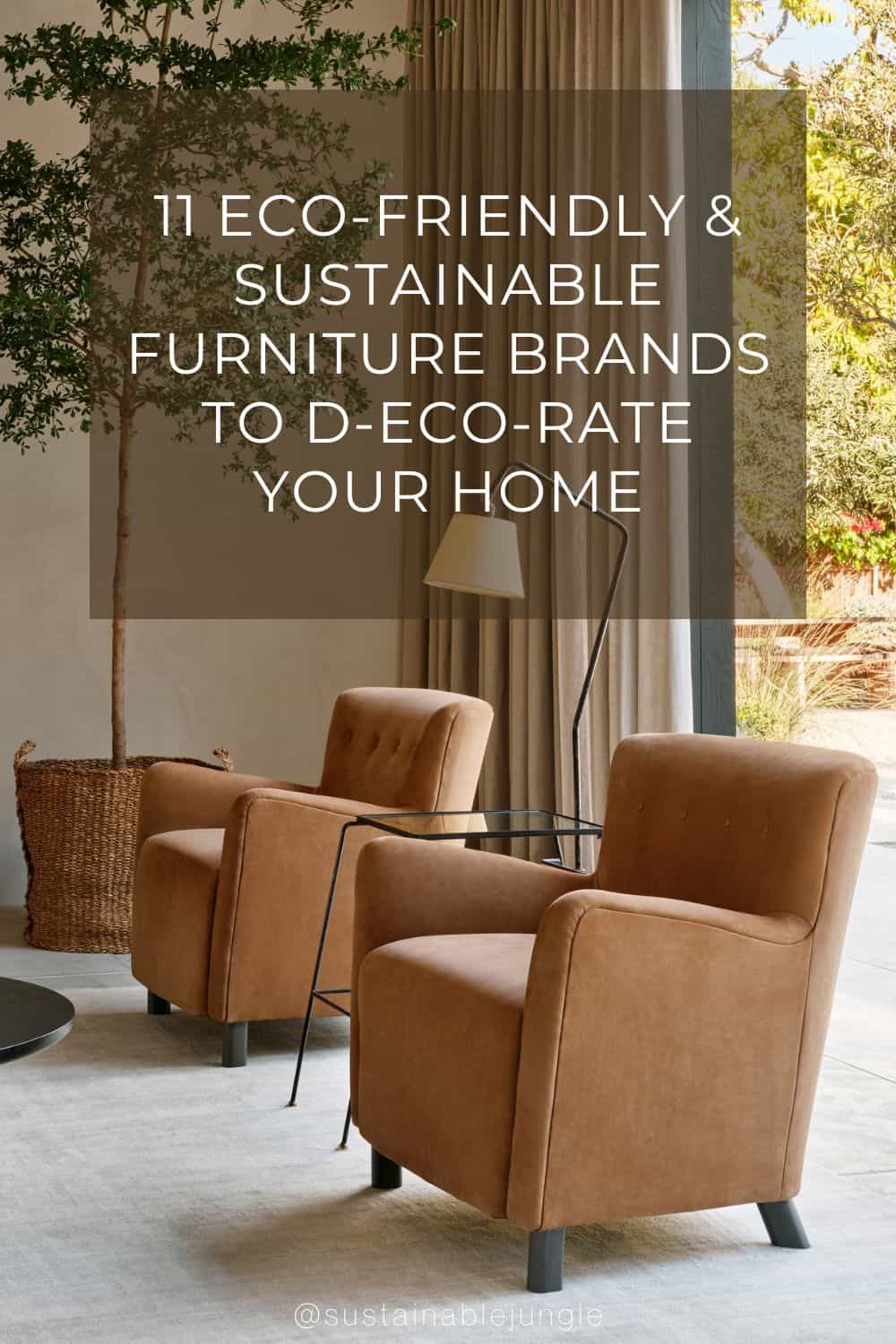

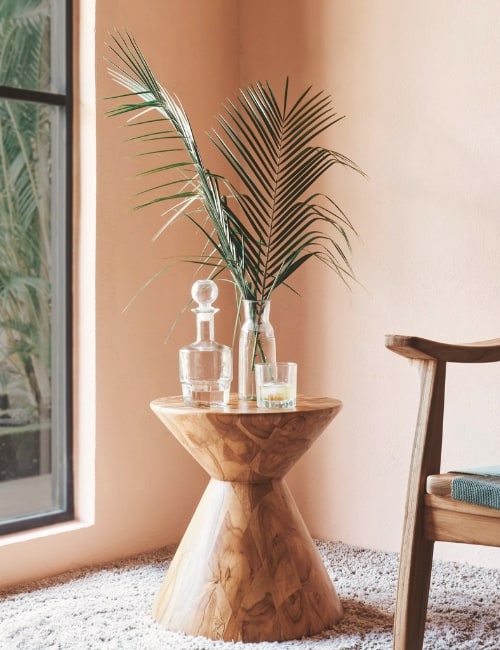
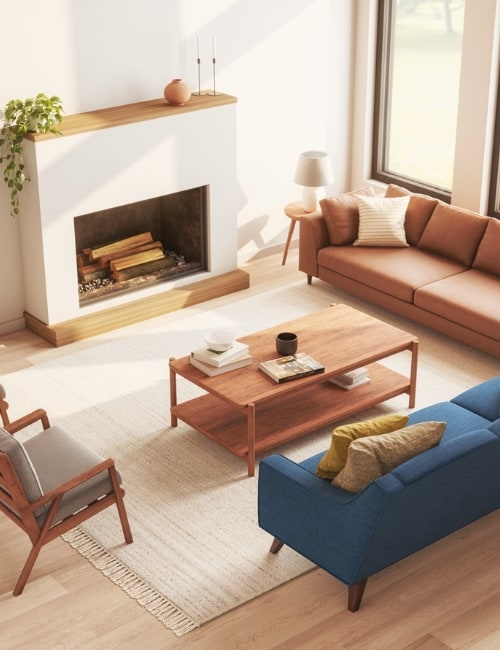
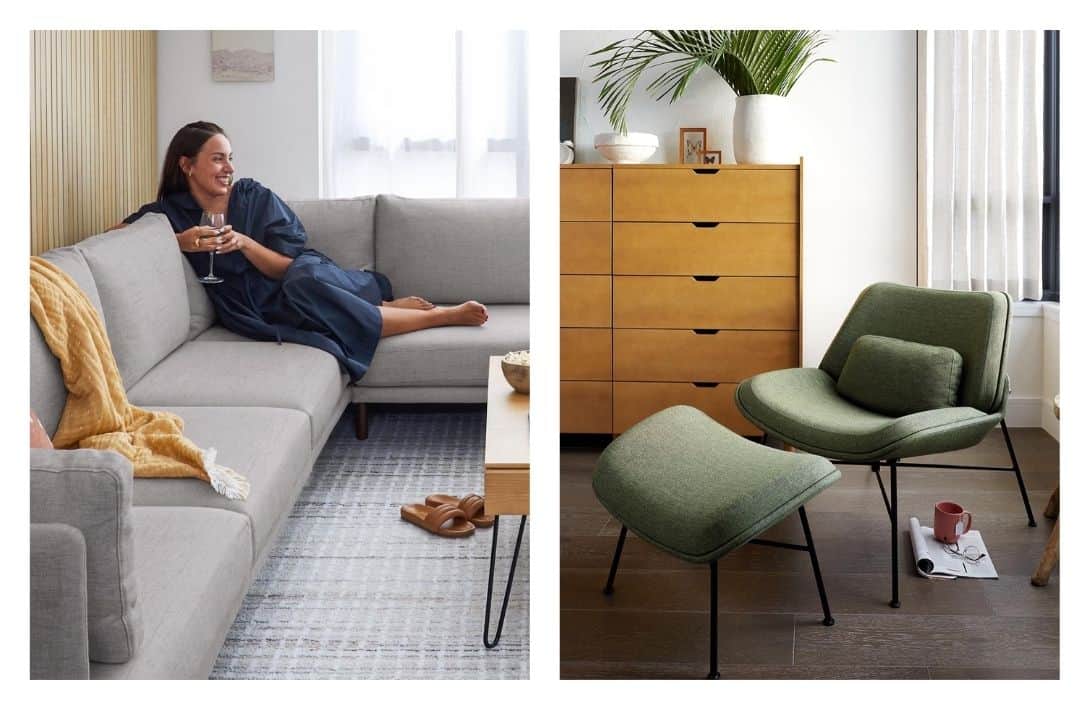
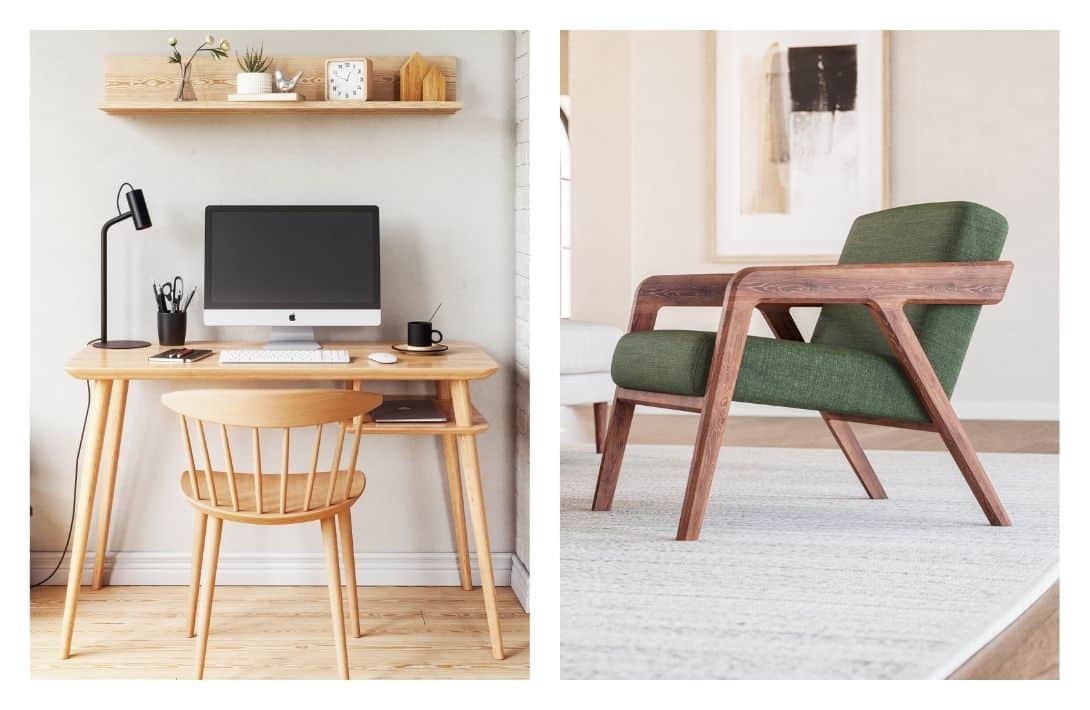
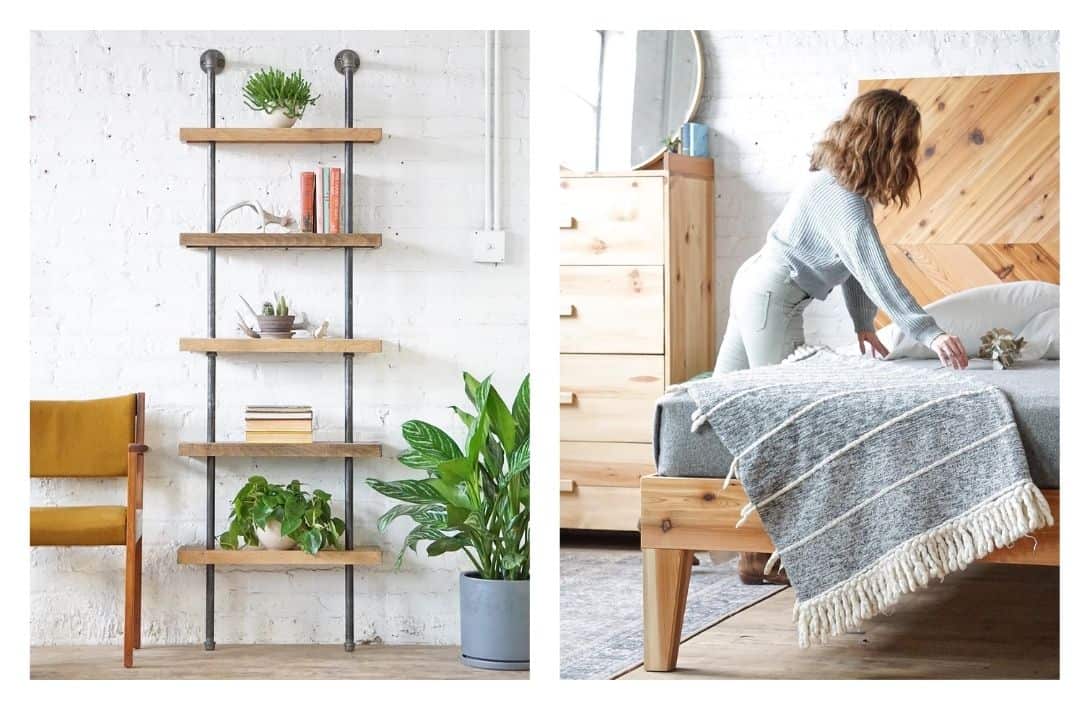
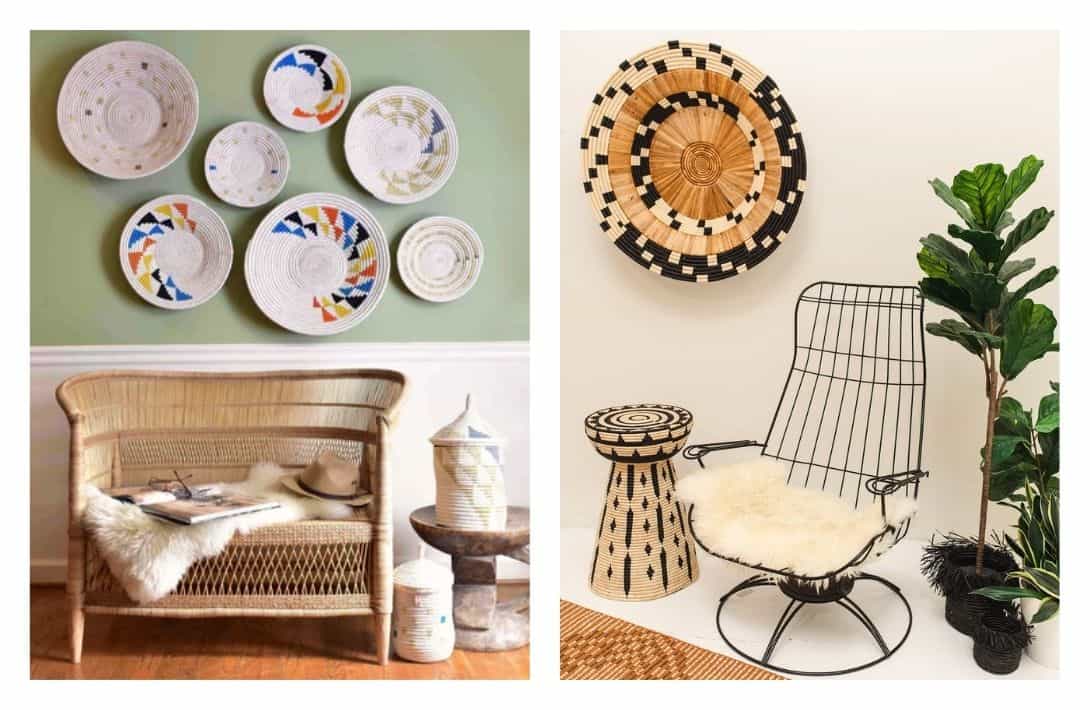
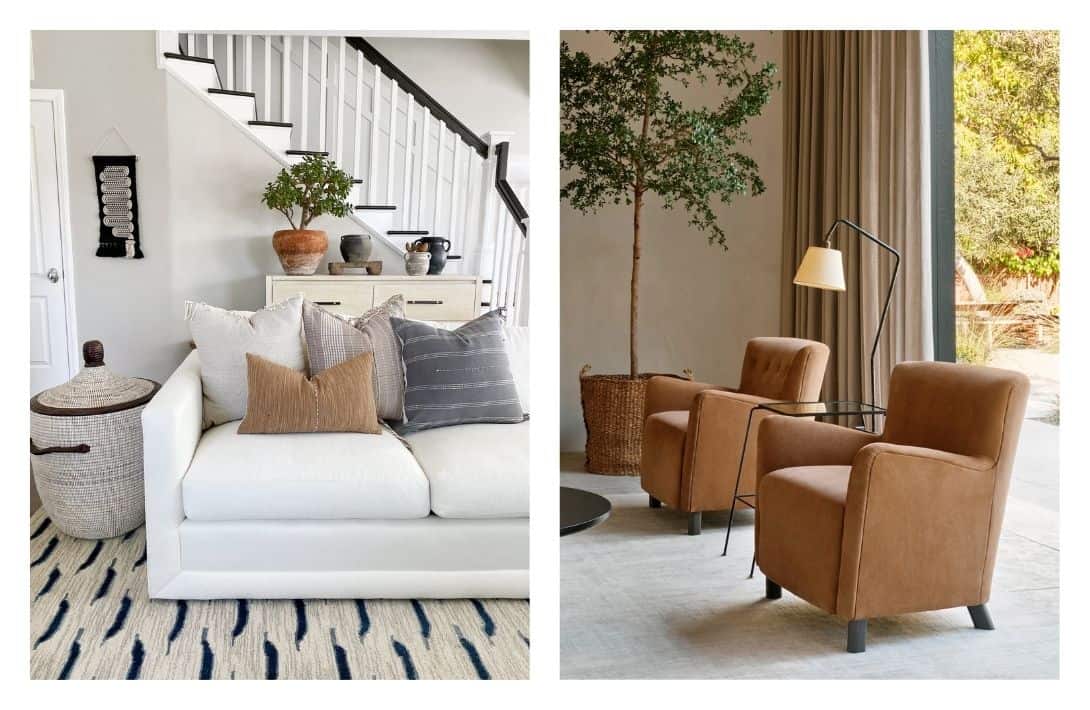
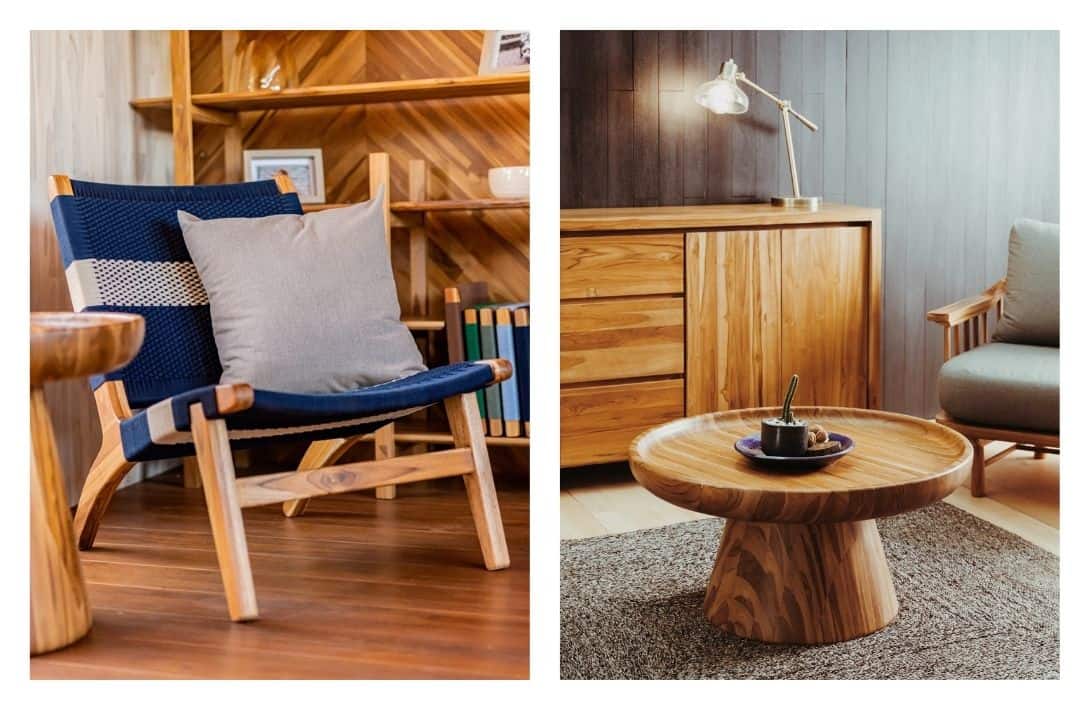
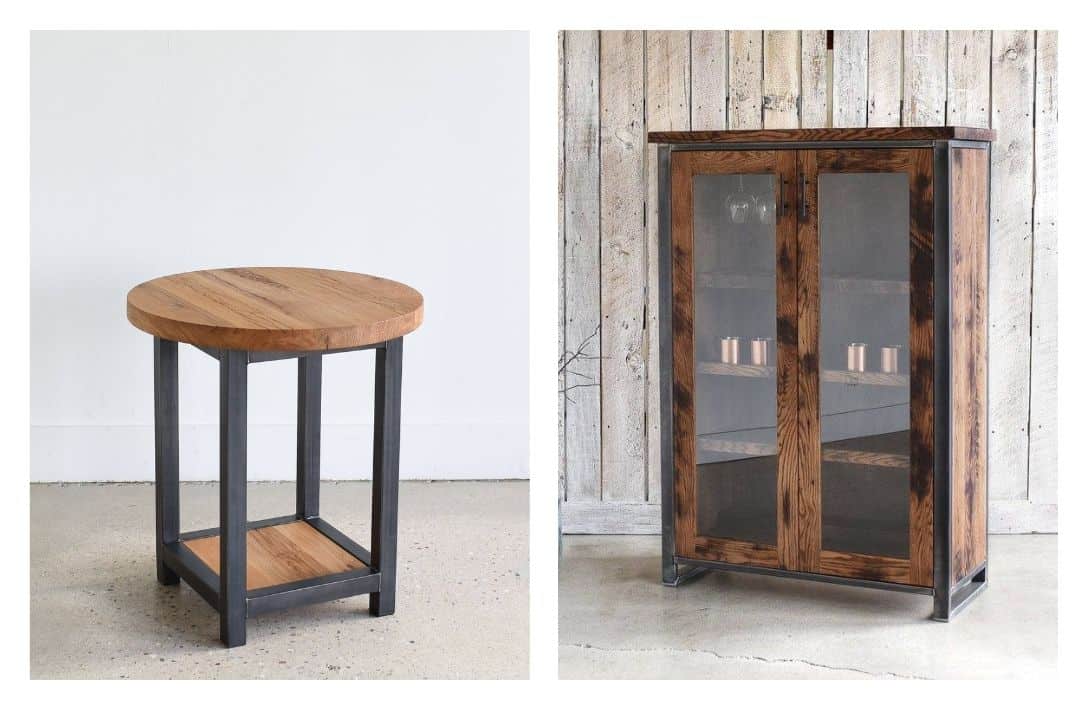
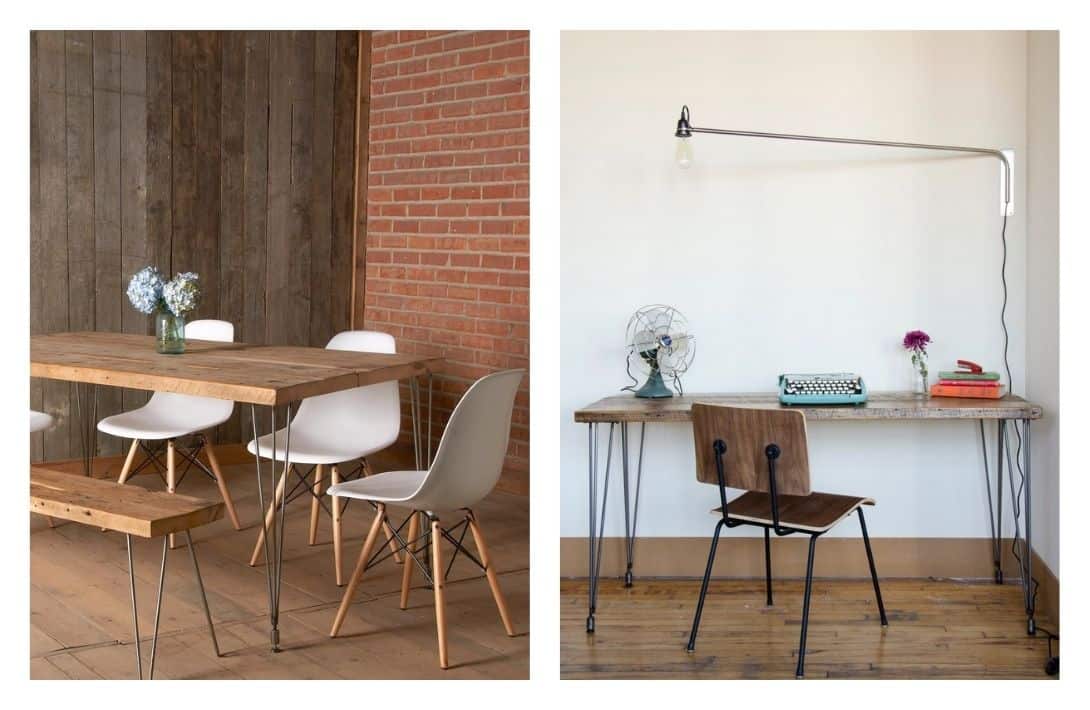
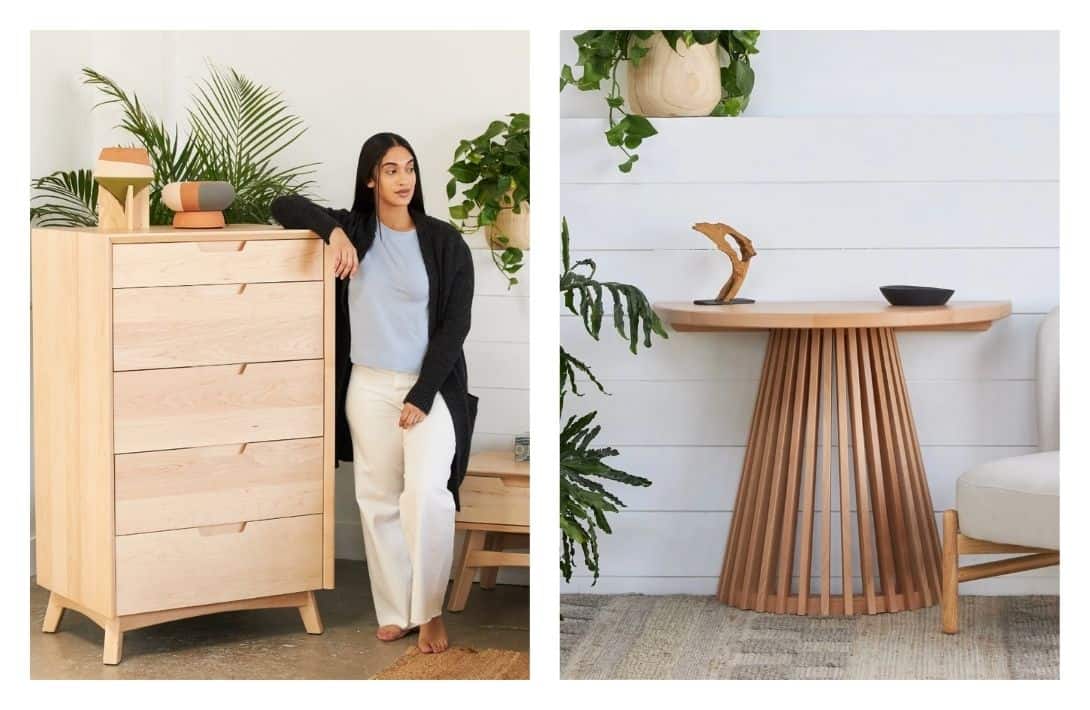
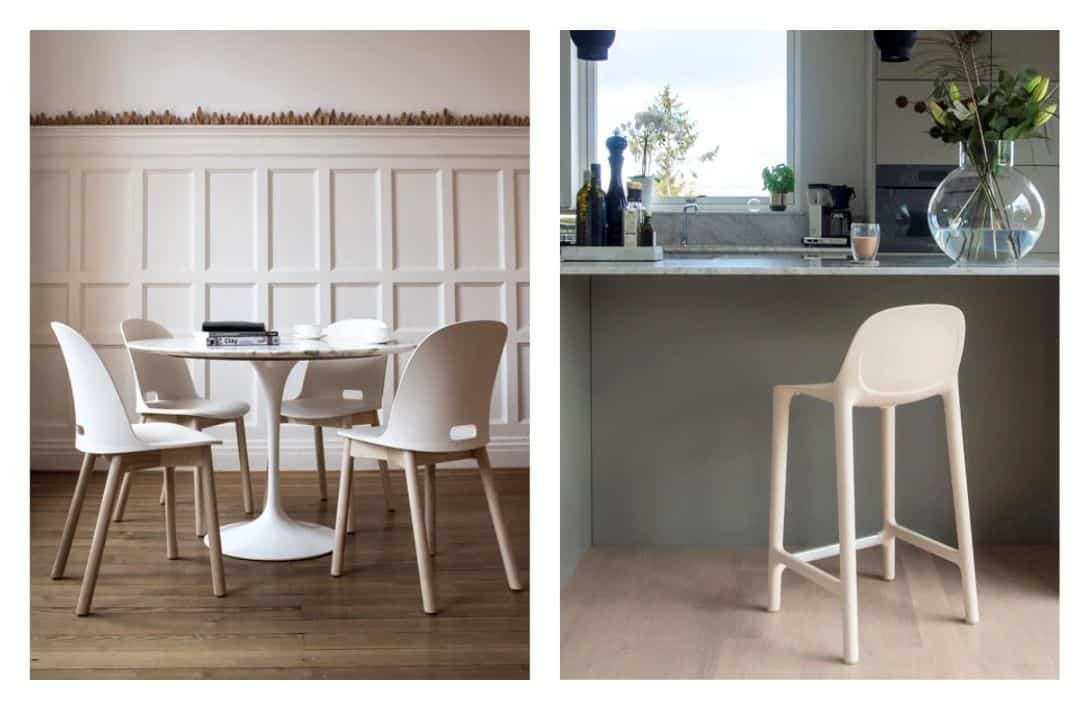
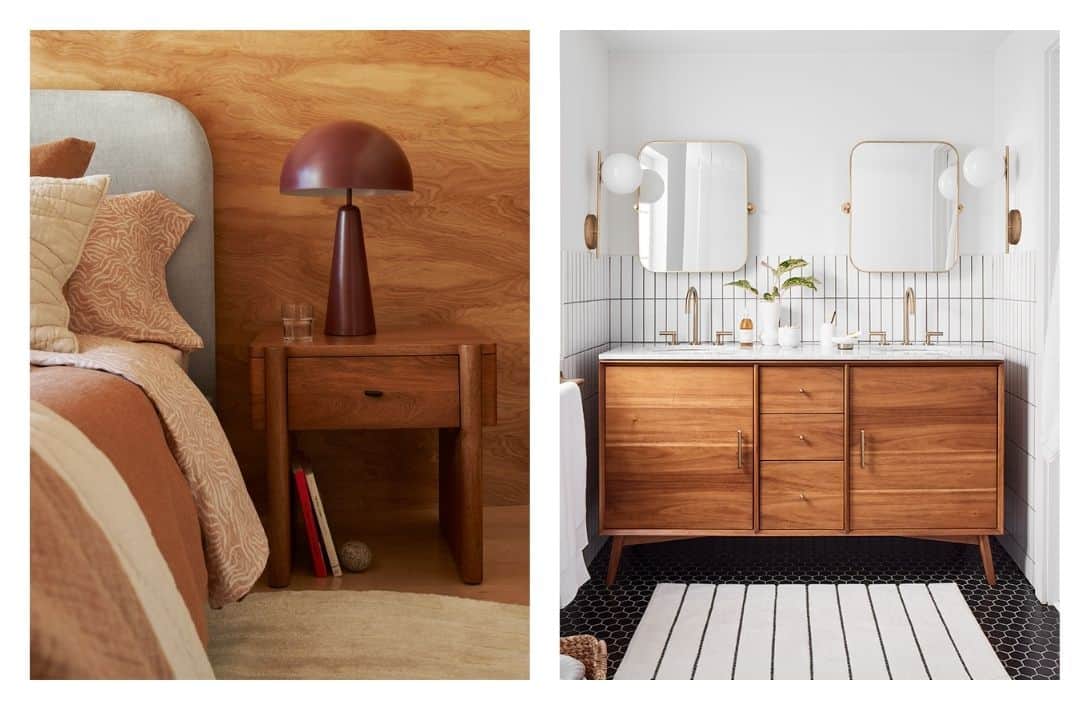
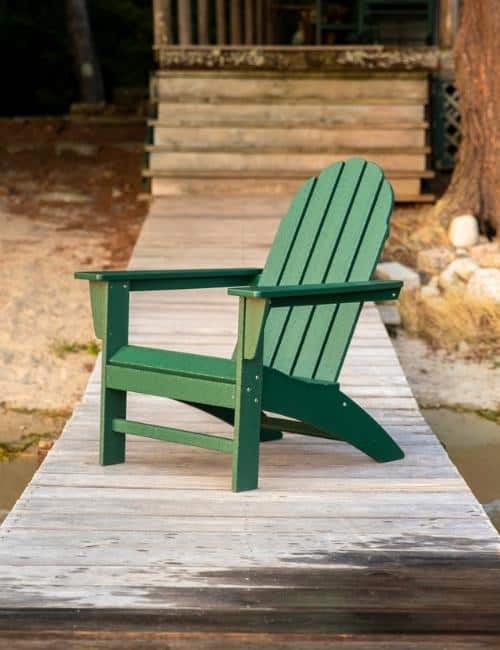
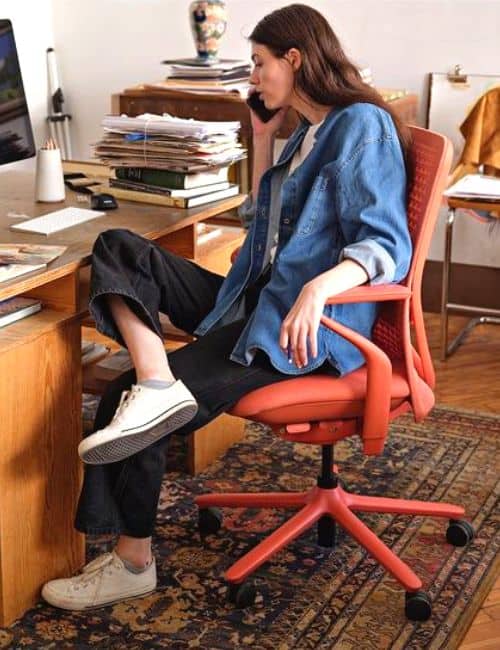
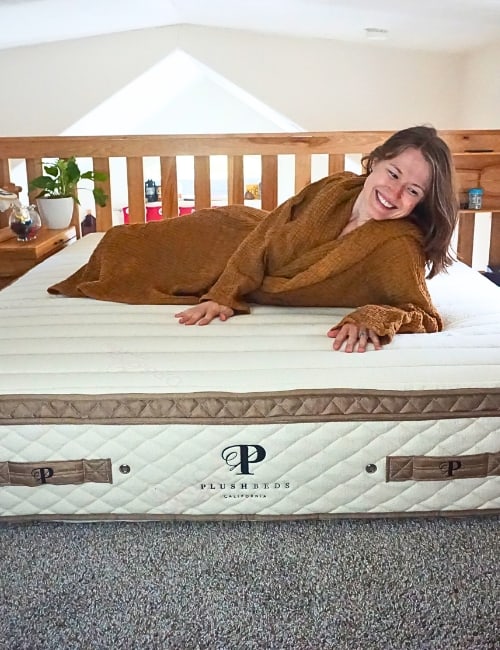
Thank you so much for sharing this! As a mom, I want to support brands that have green business practices. Happy to learn about these brands.